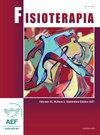Efectos de la fisioterapia cardiopulmonar sobre la fisiología en pacientes post-COVID-19
Q4 Health Professions
引用次数: 0
Abstract
Introduction
The respiratory difficulty caused by COVID-19 in severe cases leads to Intensive Care Units Acquired Weakness (ICUAW) after prolonged bed rest and treatment by invasive mechanical ventilation (IMV), which leads to a decrease in health status due to deconditioning.
Objective
To study the effects of a cardiopulmonary training program on muscle mass and strength in post-COVID-19 patients.
Methods
A quasi-experimental study was conducted with post-COVID-19 patients who were admitted to the ICU and developed ICUAW. The main variables were the diameter of the rectus femoris muscle (assessed with ultrasound), the knee extensors strength (assessed with a manual dynamometer), the strength of the inspiratory and expiratory muscles (assessed with a RPM™ system) measured at the beginning and end of the program. The program was composed of warm-up, aerobic exercise on a cycle ergometer, strength exercise and relaxation; guided by a physiotherapist. Student's t-test was used to study changes in the variables and Cohen's d statistic to study the magnitude of the change, with an alpha significance level of 0.05.
Results
25 patients completed the program (48% men). Statistically significant changes were obtained in all variables at the end of the program (P < .05) and a moderate effect size (d > 0.5) for knee strength, and large (d > 0.8) for the diameter of the rectus femoris and respiratory muscle strength.
Conclusions
The cardiopulmonary program in post-COVID-19 patients with ICUAW may have beneficial effects and clinically relevant impact on muscle mass and strength.
心肺物理疗法对COVID-19后患者生理机能的影响
新冠肺炎重症患者经长时间卧床休息和有创机械通气(IMV)治疗后,出现重症监护病房获得性虚弱(icu Acquired Weakness, ICUAW),因去适应导致健康状况下降。目的探讨心肺训练方案对新冠肺炎术后患者肌肉质量和力量的影响。方法对新冠肺炎(covid -19)后入住ICU并发生ICUAW的患者进行准实验研究。主要变量是在项目开始和结束时测量的股直肌直径(用超声评估)、膝关节伸肌力量(用手动测力仪评估)、吸气和呼气肌肉的力量(用RPM™系统评估)。该项目包括热身、自行车计力器有氧运动、力量锻炼和放松;由物理治疗师指导。采用Student's t检验研究变量的变化,采用Cohen's d统计量研究变化的幅度,α显著性水平为0.05。结果25例患者完成治疗,其中男性占48%。在项目结束时,所有变量都发生了统计学上显著的变化(P <;.05)和中等效应量(d >;0.5)为膝关节强度,且大(d >;0.8)为股直肌直径和呼吸肌力量。结论在covid -19后合并ICUAW患者中,心肺计划可能对肌肉质量和力量有有益的影响和临床相关的影响。
本文章由计算机程序翻译,如有差异,请以英文原文为准。
求助全文
约1分钟内获得全文
求助全文
来源期刊

Fisioterapia
Health Professions-Physical Therapy, Sports Therapy and Rehabilitation
CiteScore
0.50
自引率
0.00%
发文量
37
期刊介绍:
Publicación Oficial de la Sociedad Española de Fisioterapeutas. Sus páginas ofrecen desde artículos originales hasta revisiones, pasando por el estudio de casos o los actos más importantes relacionados con la especialidad.
 求助内容:
求助内容: 应助结果提醒方式:
应助结果提醒方式:


